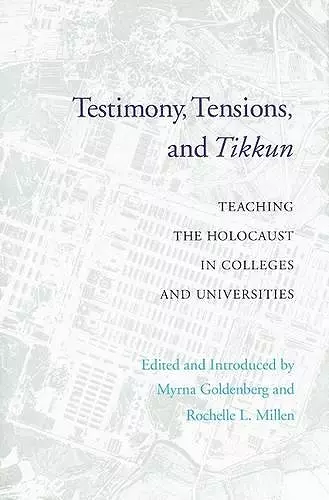Testimony, Tensions, and Tikkun
Teaching the Holocaust in Colleges and Universities
Rochelle L Millen author Myrna Goldenberg author Rochelle L Millen editor Myrna Goldenberg editor
Format:Hardback
Publisher:University of Washington Press
Published:7th Jun '07
Currently unavailable, and unfortunately no date known when it will be back

One of the strengths of this book is its scope, which invites the reader into a discussion of how to integrate the Holocaust into a range of subjects in different settings. What is most significant about the volume, however, is that the essays were written not from the vantage point of the ivory tower, but from the ground of teaching. -- Rachel N. Baum, University of Wisconsin-Milwaukee The book is unfailingly interesting. -- Michael Berenbaum, Sigi Ziering Institute, University of Judaism
The Holocaust was an upheaval in politics, culture, society, ethics, and theology. This book can be read as an injunction to teach and act in a manner with a message: that there can be no tolerance for moral neutrality about the Holocaust, and that there is no subject in the humanities or social sciences where its shadow has not reached.
The Holocaust was a cataclysmic upheaval in politics, culture, society, ethics, and theology. The very fact of its occurrence has been forcing scholars for more than sixty years to assess its impact on their disciplines. Educators whose work is represented in this volume ask their students to grapple with one of the grand horrors of the twentieth century and to accept the responsibility of building a more just, peaceful world (tikkun olam). They acknowledge that their task as teachers of the Holocaust is both imperative and impossible; they must "teach something that cannot be taught," as one contributor puts it, and they recognize the formidable limits of language, thought, imagination, and comprehension that thwart and obscure the story they seek to tell. Yet they are united in their keen sense of pursuing an effort that is pivotal to our understanding of the past-and to whatever prospects we may have for a more decent and humane future.
A "Holocaust course" refers to an instructional offering that may focus entirely on the Holocaust; may serve as a touchstone in a larger program devoted to genocide studies; or may constitute a unit within a wider curriculum, including art, literature, ethics, history, religious studies, jurisprudence, philosophy, theology, film studies, Jewish studies, German studies, composition, urban studies, or architecture. It may also constitute a main thread that runs through an interdisciplinary course.
The first section of Testimony, Tensions, and Tikkun can be read as an injunction to teach and act in a manner consistent with a profound cautionary message: that there can be no tolerance for moral neutrality about the Holocaust, and that there is no subject in the humanities or social sciences where its shadow has not reached. The second section is devoted to the process and nature of students' learning. These chapters describe efforts to guide students through terrain that hides cognitive and emotional land mines. The...
"In a well-organized format, the editors of the book have compiled a highly readable set of essays offering practical suggestions for educators across the disciplines..Not only do these expert teachers encourage other instructors to include outcomes related to ethics and morals on a class syllabus, but they also encourage teachers and their students to use course material as a force for change and resistance."
(H-Net)"By exploring the challenges, personal and professional, to those who teach and by assessing student learning outcomes, this volume provides a valuable contribution to Shoah education. ."
(Shofar: An Interdisciplinary Journal of Jewish StudISBN: 9780295986876
Dimensions: unknown
Weight: 617g
336 pages